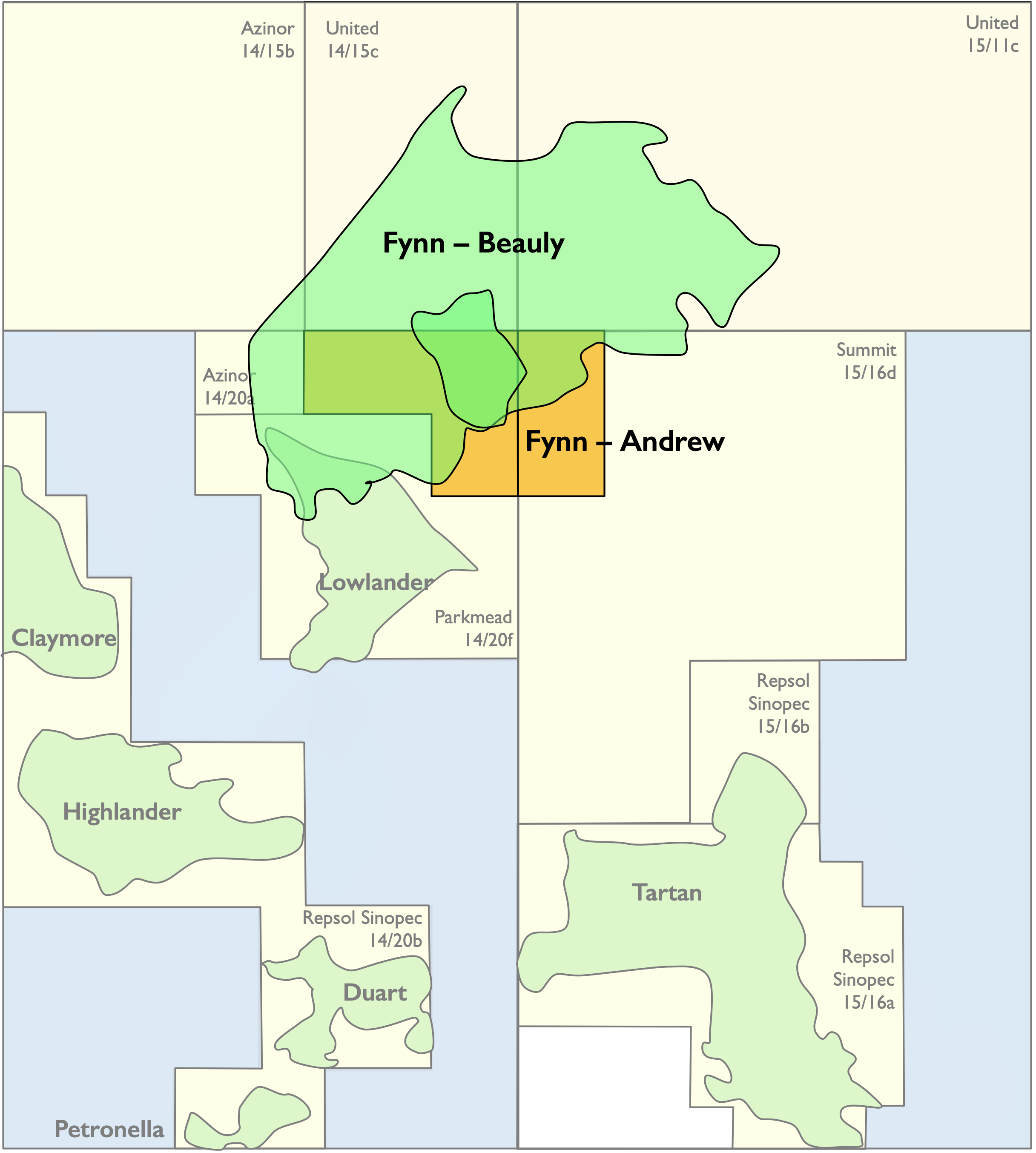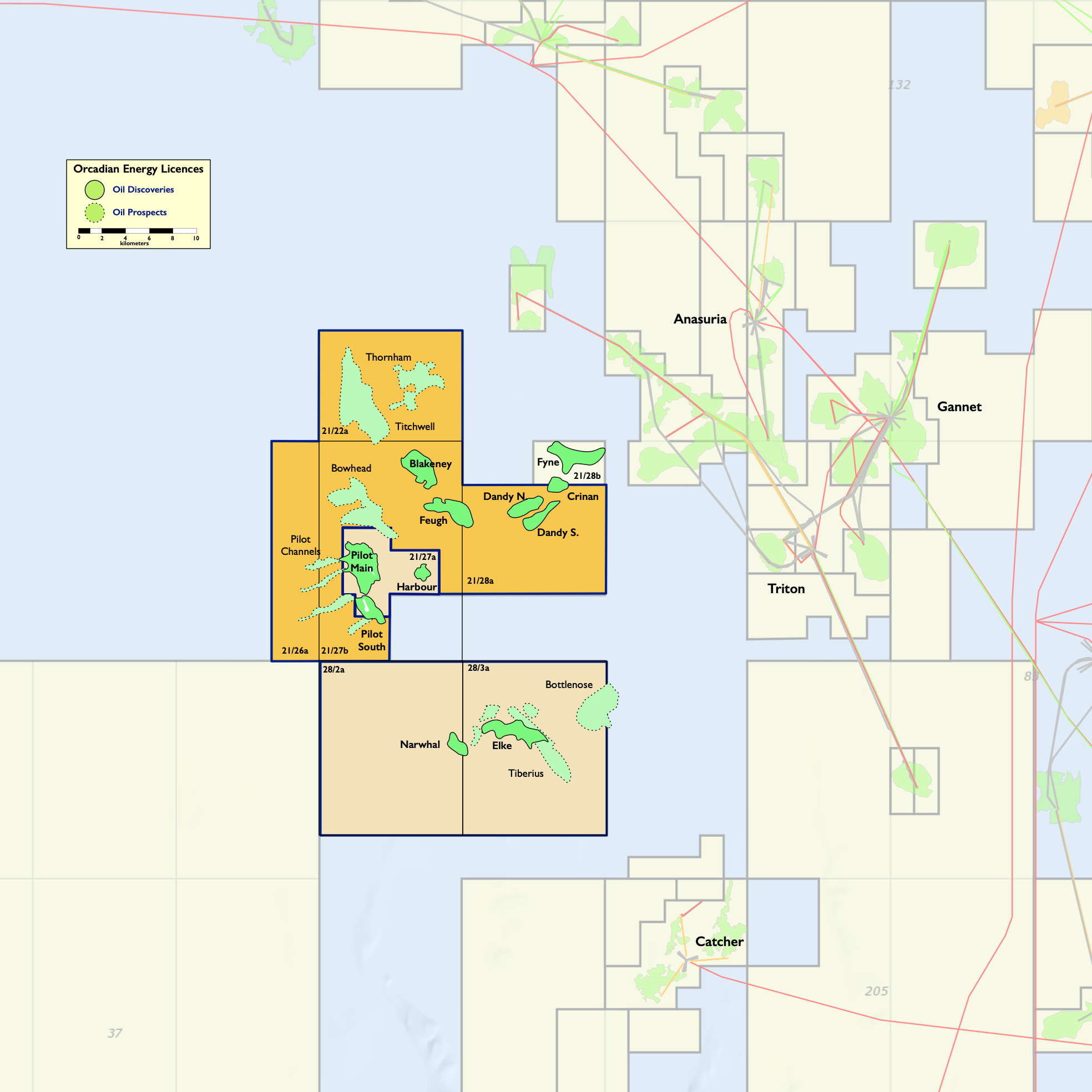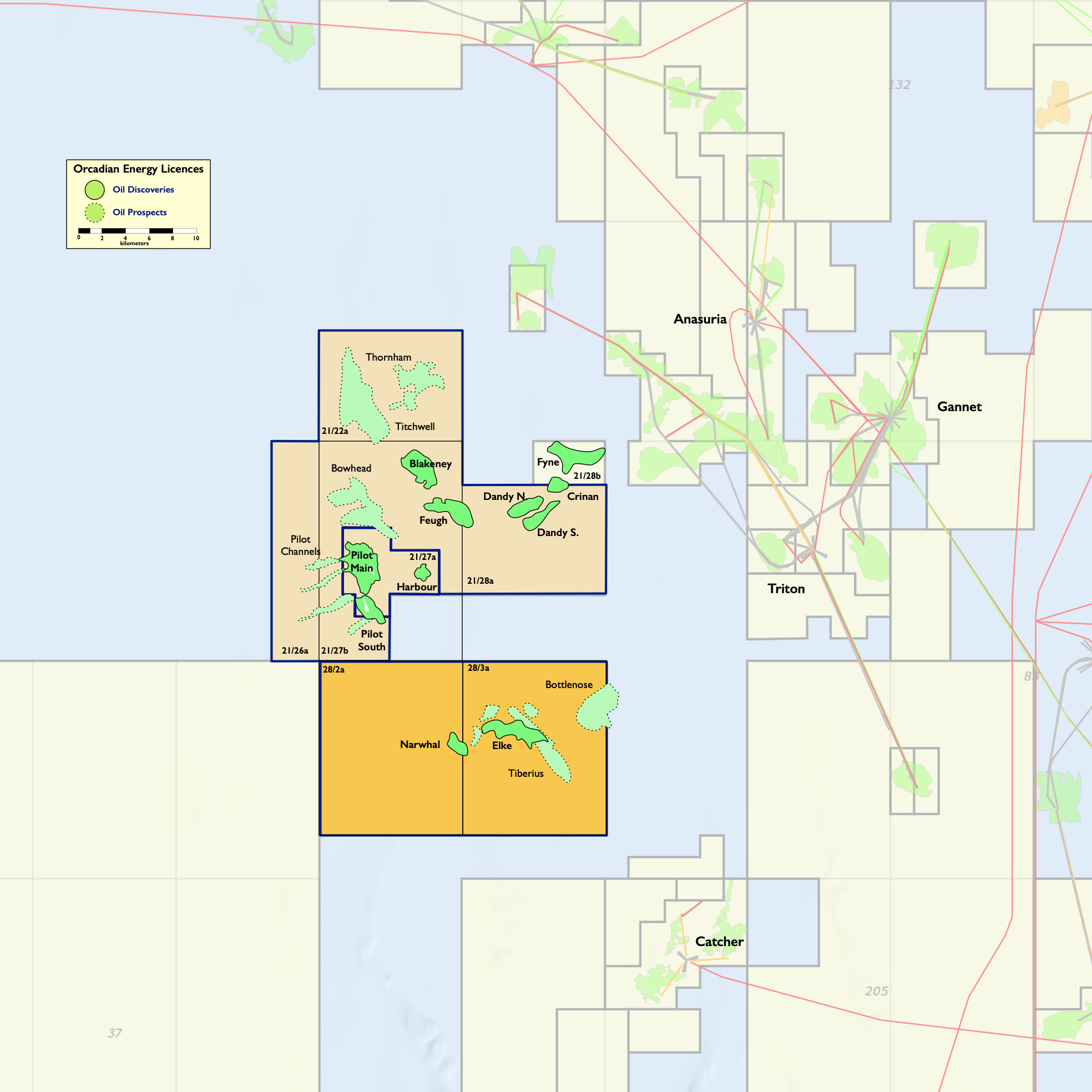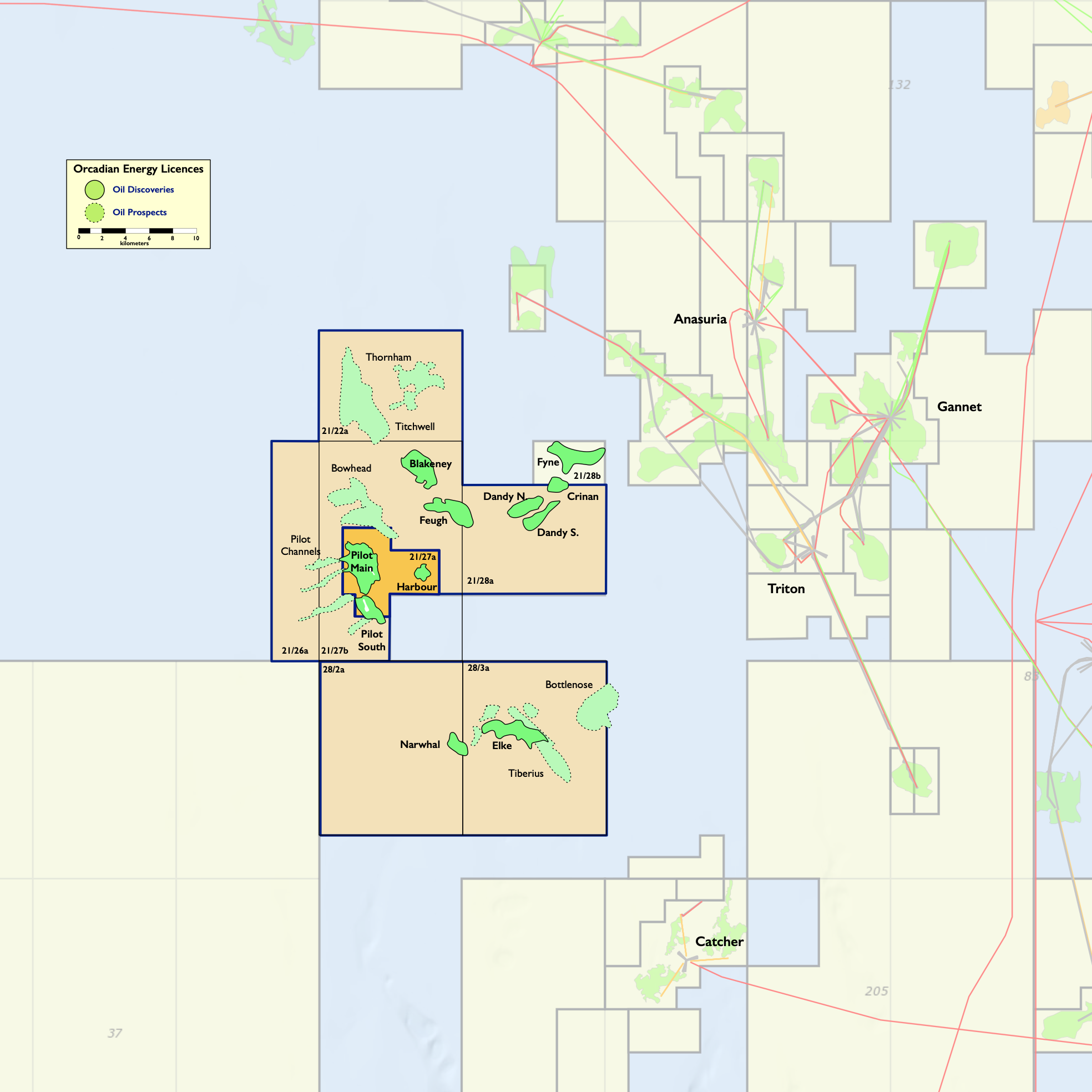6 December 2021
Orcadian Energy plc
(“Orcadian Energy”, “Orcadian” or the “Company”)
OGA Electrification Competition
Orcadian Energy (AIM: ORCA), the North Sea focused oil and gas development company, is delighted to announce that following a competitive process it has been selected by the Oil and Gas Authority (“OGA”) to evaluate an approach to the electrification of North Sea oil and gas platforms which will dramatically cut carbon emissions.
Highlights:
- Orcadian has been awarded £466,667 by the OGA to evaluate a new concept for the electrification of key producing oil and gas fields initially focussing on Central Graben area fields owned and operated by others
- Orcadian will also produce an Industry White Paper which describes this approach to electrification of offshore oil and gas platforms
- Orcadian’s concept would use renewable energy, generated from local wind farms, for the bulk of the electricity required; with back-up power generated from gas or net zero fuels, supported by batteries for a fast response
- Orcadian is working with Crondall Energy, Enertechnos, Petrofac, North Sea Midstream Partners (“NSMP”) and Wärtsilä; together the working group will undertake an evaluation of this concept and deliver a report to the OGA and Central Graben Operators by the end of March 2022
- The evaluation will include a commercial proposal for the delivery of electrical power to Central Graben and Central North Sea Operators interested in rapidly implementing electrification of their platforms
OGA Competition
The OGA launched a £1 million decarbonisation competition to explore the electrification of offshore oil and gas installations on 23 September 2021. The OGA was looking for studies (technical, engineering, and/or commercial) that would bring electrification projects a step closer to reality. On behalf of the working group, Orcadian submitted an entry to the competition, and has undertaken to evaluate this concept and deliver a report, and an Industry White Paper, to the OGA and the Central Graben operators by the end of March 2022.
Orcadian Electrification Concept
Orcadian has been an active participant in the Central North Sea Accelerated Energy Transition Plan (CNS AETP) working group andhas selected a floating wind turbine as a key means of reducing emissions from the Pilot field development. Operators in the CNS AETP have largely focussed on power-from-shore as a means of electrifying the CNS.
Orcadian’s proposal is to utilise renewable energy, generated in local wind farms, for the bulk of the electricity required on the fields; with back-up power generated efficiently from gas or net zero fuels, supported by batteries for a fast response. It is, taken together, one of the most effective and practical ways to lower emissions in the oil and gas production process.
This approach would dispense with the requirement for a cable to shore, be significantly less costly, and the project could be implemented on a faster timescale, with simpler brownfield modifications on the existing platforms and less disruption to supply from these critical assets, which supply about a quarter of UK gas production. In addition, the Directors believe the UK’s energy supplies would be much more secure using this approach when compared with relying on a single high voltage direct current (HVDC) cable from shore to support production of oil and gas from the area.
Orcadian submitted this proposal on 25 October 2021 and was one of three winners. Orcadian will utilise the funds from this competition to engage the working group to prepare and deliver this report on an accelerated timescale.
Commercial Opportunity
The Directors believe that this opportunity presents an additional commercial benefit to the Company and its investors. Orcadian plans, with support from North Sea Midstream Partners (NSMP), Petrofac as EPC (Engineering, Procurement and Construction) and O&M (Operations & Maintenance) contractor, and Wärtsilä as a potential key supplier, alongside Crondall and Enertechnos, to develop a commercial proposal for the delivery of electrical power to Central Graben and any North Sea Operators interested in rapidly implementing electrification of their platforms.
Carlo Procaccini, OGA Head of Technology, said:
“Decarbonisation of oil and gas operations is an industry imperative over the next decade, and platform electrification from renewable sources will be an effective way to achieve that. We were delighted with the strong industry interest in the £1m BEIS / OGA electrification competition and the quality of the winners’ submissions. Orcadian Energy’s study, alongside the two other selected projects, will assess innovative solutions to kickstart O&G electrification on the UKCS”
Steve Brown, Orcadian’s CEO, said:
“We are delighted with this news, which is a vote of confidence in the sustainable production methods Orcadian has helped to identify. From our perspective, minimising the cost of Net Zero is of paramount importance, the lower we make the cost of abatement, the more we can afford to do. Industry and Government have both committed to electrification of North Sea platforms – which will be vital in the energy transition. We intend that our contribution be to radically reduce the cost of implementing electrification.
“We had worked very closely with our consulting engineers, Crondall Energy, to minimise emissions on Pilot, and together we had learned a lot about how best to integrate renewable energy generation with oil and gas production facilities. In terms of emissions reduction, maximising renewable energy usage compared very well with the alternative of “onshoring” the responsibility for decarbonisation to the national grid, and, in the case of Pilot at least, was much less costly.
“We have identified a new, but well advanced, enabling technology which minimises power losses associated with transmitting medium voltage alternating current over miles of cable. We understand the cable designer, Enertechnos, is planning to install a 28km cable in Wales in 2022, to prove the concept in a real-world setting.
“As part of the evaluation of this alternative concept, we intend to select the very best renewable energy system to provide the bulk of the power to the platforms; we have already entered into discussions with both Floating Power Plant A/S and Wind Catching Systems AS, and we intend to listen to what every potential wind technology provider has to offer.
“Backing up the system with highly efficient gas reciprocating engines is a practical and proven method to provide a reliable power supply and enables implementation of the project on an accelerated time scale.
“Since we conceived this approach in early October 2021, we have been delighted with the enthusiastic response of all of the companies with whom we have shared our conceptual solution. We are excited to work with North Sea Midstream Partners, Petrofac and Wärtsilä to develop a commercial offering to CNS Operators which we believe will be truly compelling.”
Orcadian has published a short presentation which explains more about our concept, please follow this link to watch the video: https://bit.ly/OGA_Electrification
For further information on the Company please visit the Company’s website: https://orcadian.energy
MAR Statement
The information contained within this announcement is deemed by the Company to constitute inside information as stipulated under the Market Abuse Regulations (EU) No. 596/2014 (MAR). Upon the publication of this announcement via Regulatory Information Service (RIS), this inside information is now considered to be in the public domain.
Contact:
| Orcadian Energy plc | + 44 20 7920 3150 |
|
Steve Brown, CEO Alan Hume, CFO |
|
| WH Ireland (Nomad and Joint Broker) | +44 20 7220 1666 |
|
Harry Ansell / Fraser Marshall (Corporate Broking) Katy Mitchell / Andrew de Andrade (Nomad) |
|
| Shore Capital (Joint Broker) | +44 20 7408 4090 |
|
Toby Gibbs / James O’Neill (Advisory) |
| Tavistock (PR) | + 44 20 7920 3150 |
|
Nick Elwes Simon Hudson Matthew Taylor |
[email protected] |
| Charlesbye (PR) | + 44 7403 050525 |
|
Lee Cain / Lucia Hodgson |
About Orcadian Energy
Orcadian is a North Sea oil and gas operator with a difference. In planning its Pilot development, Orcadian has selected wind power to transform oil production into a cleaner and greener process. The Pilot project is moving towards approval and will be amongst the lowest carbon emitting oil production facilities in the world, despite being a viscous crude. Orcadian may be a small operator, but it is also nimble, and it has grasped opportunities that have eluded some of the much bigger companies. As we strike a balance between Net Zero and a sustainable energy supply, Orcadian intends to play its part to minimise the cost of Net Zero and deliver reliable organic energy.
Orcadian Energy (CNS) Ltd (“CNS”), Orcadian’s operating subsidiary, was founded in 2014 and is the sole licensee of P2244, which contains 78.8 MMbbl of 2P Reserves in the Pilot discovery, and of P2320 and P2482, which contain a further 77.8 MMbbl of 2C Contingent Resources in the Elke, Narwhal and Blakeney discoveries (as audited by Sproule, see the CPR in the Company’s Admission Document for more details). Within these licences there are also 191 MMbbl of unrisked Prospective Resources. These licences are in blocks 21/27, 21/28, 28/2 and 28/3, and lie 150 kms due East of Aberdeen. The Company also has a 50% working interest in P2516, which contains the Fynn discoveries. P2516 is administered by the Parkmead Group and covers blocks 14/20g and 15/16g, which lie midway between the Piper and Claymore fields, 180 kms due East of Wick.
Pilot, which is the largest oilfield in Orcadian’s portfolio was discovered by Fina in 1989 and has been well appraised. In total five wells and two sidetracks were drilled on Pilot, including a relatively short horizontal well which produced over 1,800 bbls/day on test. Orcadian’s proposed development plan for Pilot is based upon a Floating Production Storage and Offloading vessel, with over thirty wells to be drilled by a Jack-up rig through a pair of well head platforms and will include a floating wind turbine to provide much of the energy used in the production process. Emissions per barrel produced are expected to be about an eighth of the 2020 North Sea average and to lie in the lowest 5% of global oil production.
About Crondall Energy
Crondall Energy Ltd is a leading independent consultancy providing strategic, commercial and technical services for offshore energy projects. Crondall works with a range of project stakeholders, including energy companies, investors and law firms; and helps their clients to manage technical, commercial and strategic risks and achieve positive project outcomes. Crondall are passionate about the role of the offshore industry in providing society’s sustainable energy and are actively engaged in supporting their clients to confront the challenges of generating low carbon energy and renewable energy in the ocean environment.
About Enertechnos
Enertechnos Limited is an electrical engineering business, founded in 2014, that is focused on improving the efficiency of cables used in any kind of electrical distribution grid. Enertechnos’s Capacitive Transfer System (CTS) allows cable manufacturers to manufacture more efficient cable for Transmission & Distribution grids at a similar cost to incumbent cables on the market and using their existing manufacturing equipment. CTS uses a unique and patented topology to balance the reactance inherent in distribution cable with capacitance, thus substantially reducing losses and allowing transmission of greater amounts of energy with lesser amounts of conductor than with conventional cable. Enertechnos works with the incumbent cable manufacturers to improve their offering and markets alongside them to the end buyers (e.g. Distribution Network Operators who install, maintain and upgrade grids, as well as Renewable Energy, Offshore Oil & Gas, Mining, and Electric Vehicle companies).
About Petrofac
Petrofac is a leading international service provider to the energy industry, with a diverse client portfolio including many of the world’s leading energy companies.
Petrofac designs, builds, manages, and maintains energy infrastructure. Our purpose is to enable our clients to meet the world’s evolving energy needs.
Petrofac’s core markets are in the UK North Sea, the Middle East and North Africa (MENA) region where we have built a long and successful track record of safe, reliable, and innovative execution, underpinned by a cost effective and local delivery model with a strong focus on in-country value. We operate in several other significant markets, including India, Southeast Asia, and the United States. We have 9,400 employees based across 31 offices globally. Petrofac is quoted on the London Stock Exchange (symbol: PFC).
For additional information, please refer to the Petrofac website at www.petrofac.com
About NSMP
NSMP is a leading independent midstream business with large-scale gas infrastructure assets serving the North Sea. NSMP transports and processes natural gas from customers across the West of Shetlands, Northern North Sea, Norwegian North Sea, Central North Sea and Southern Gas Basin. NSMP provides essential services to over 35 fields owned by energy majors, utilities and independent producers, through a combined gas pipeline length of nearly 600km making NSMP’s infrastructure the largest and most diversified gas transportation and processing system in the UK. NSMP also owns and operates a small-scale Bio/LNG plant in Norway. NSMP is committed to using its assets to make a positive difference to both security of supply and the energy transition.
Learn more about NSMP’s commitment and involvement in relation to ESG and Energy Transition at: https://nsmp-limited.com For more information on NSMP please contact: Laura Jarvie: [email protected]
About Wärtsilä
Wärtsilä is a global leader in innovative technologies and lifecycle solutions for the marine, oil & gas and energy markets. We emphasise innovation in sustainable technology and services to help our customers continuously improve their environmental and economic performance. Our team of 17,500 professionals in 200 locations in more than 70 countries shape the decarbonisation transformation of our industries across the globe.




